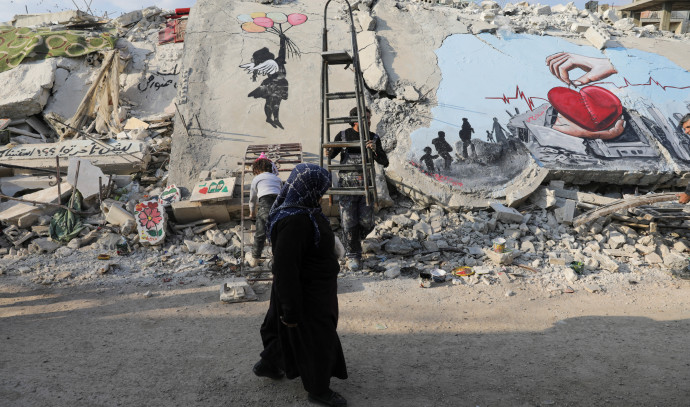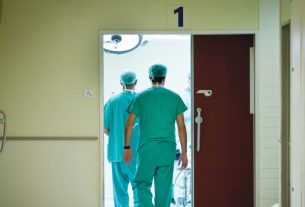Six months after Syria suffered a devastating earthquake that killed nearly 8,500 people there (and 51,000 in Turkey), medics in northwest Syria struggle to provide much-needed healthcare.
Daniel Skyle wrote in the latest issue of the prominent British general medical journal The Lancet that the situation is chaotic, with many doctors having fled the country, a severe shortage of medications and medical equipment – even anesthetics – and a significant rise in suicides due to a mental health crisis.
The earthquake came after 12 years of brutal, ongoing armed conflict, Skyle wrote. “Syrian health-care workers are now trying to maintain a functioning healthcare system for 4·2 million people in Syria’s northwest, an area reliant on foreign aid and still being bombed by the regime and Russia. There are three border crossings for humanitarian aid into the northwest, the main one being the Bab al-Hawa crossing from Turkey.”
UN aid to Syria struggles to get through
Last month, Russia vetoed the UN Security Council to block further import of UN-governed humanitarian aid into the region, shifting control to Damascus, although it cannot close the crossing itself. Earlier this month, the Syrian Government authorized the UN to use Bab al-Hawa for another half-year months from July 13. Future control over allowing UN aid to enter will likely remain in the hands of the regime rather than the Security Council. The veto is part of Russia’s ongoing support of the Syrian regime, which has long used the manipulation of humanitarian aid as a tool to weaken the area, Skyle continued.
“Due to the regime targeting health-care workers, during the peak of the conflict, the most dangerous place in Syria was inside a hospital,” said Dr. Munzer Alkhalil, an orthopedic surgeon who has worked in hospitals that were attacked 21 times. The doctor was one of the founders of the Idlib Health Directorate a decade ago.
“In addition to the bombings and the war, before the earthquake, there were many outbreaks. The latest was cholera. There is rarely electricity or clean water. There are few health-care professionals in these areas now. Many doctors left, many were killed during the conflict, many taken by the regime and tortured, and many killed during the earthquake. 90% of people live below the poverty line,” he said. “Added to this, we have the ongoing bombings of health-care facilities by the regime and Russia. The military campaign in 2019 bombed 70 health facilities. This was the situation before the earthquake. Now, it has become much, much worse.”
Skyle wrote in the article simply entitled “Syria after the earthquake” that the Syrian-American Medical Society verified 750 attacks by the regime against hospitals. A report by Physicians for Human Rights found that at least 948 health-care workers were murdered during the war: 92% of medical personnel killings were committed by Syrian Government forces and their Russian allies.
Natalie Roberts, executive director of Médecins Sans Frontières UK, did four tours in Syria and saw the beginning of the conflict, the rise of the so-called Islamic State, and now the ongoing efforts to rebuild health care and governance. “There is a narrative of the conflict being finished, and it is not,” she told Skyle. “I think the general public do not know this is still an active conflict and that there is a functioning governance system in place in the northwest of Syria, if not perfect.”
The head of the Idlib Health Directorate, Zuhair Qarrat, convened a crisis team for the northwest after the earthquake, coordinating with the Syria Civil Defense (known as The White Helmets), non-governmental organizations, and other health directorates. He said that “one of the few positives he sees after the earthquake is that NGOs coordinate better—the crisis created stronger collaboration among different actors. But overall, the picture went from bleak to worse. Many international support teams arrived and had access to Turkey, but it took eight days before international aid was allowed into the northwest.
Many of the hospitals’ existing resources were used within the first 12 hours, with almost no refilling of them since. “We have very little for salaries and very little for drugs. Mostly, patients have to buy their own drugs, and drugs on the black market might be wrong label or outdated. We have very little anesthesia for surgeries, and often have to rely on those that out of date. We need specialist everything. And we badly need equipment, like dialysis machines, said Qarrat.
The physician told Skyle about the need for an oncology center with radiotherapy, “If we get this, we would not need Turkey or any other country to refer patients to. We have more than 3,000 cancer patients who have no treatment possibilities unless they pay for treatment in Turkey. We are losing them every day.”
The author reported that “there is a growing mental-health crisis and increasing suicide rates as scarcity of food, resources, and health care blends with trauma from the war and the suffering from the earthquake. In northwest Syria, 1·7 million people live in displacement camps; the northwest had three times the casualties from the earthquake compared with regime-controlled areas, but most aid ended up in the regime-controlled areas.” Alkhalil describes the northwest as “a big prison with 4·2 million people in it. They will not go into the regime area, so it’s either stay here, go to Turkey or cross the sea. They just try to stay alive, day by day. Some 11,000 families became homeless because of the earthquake, and the area was already crowded.” There is only one psychiatrist in the whole northwest. There are psychological healthcare workers, but the need is vast. Cases of antibiotic resistance are rising. We need training for midwives, oncologists, neurosurgeons, by specialists who can come in and teach locally. But there is no funding for training.”
Like other Syrian doctors, Qarrat sounds very tired. “We have known this feeling for many years, not just from this crisis,” he told Skyle. “And when Assad used chemical weapons, we felt in the same state. Now we have the earthquake and the humanitarian aid crossing problems added on top. To the international community, I say, please help us. We can build our health care and society to be safe ourselves, and have freedom here.”


